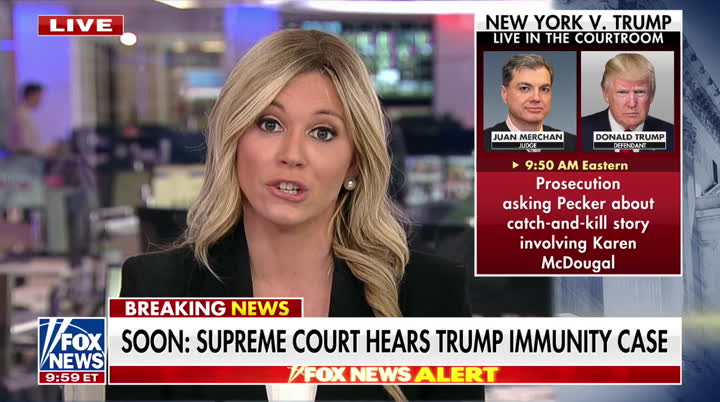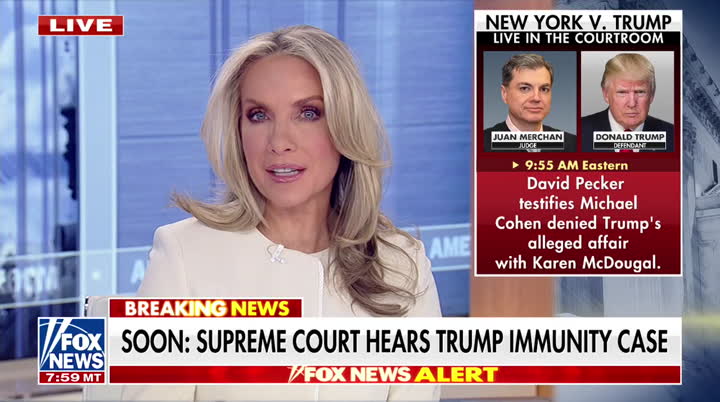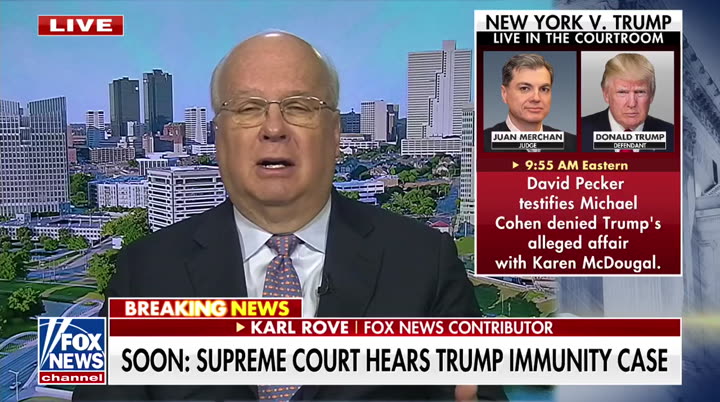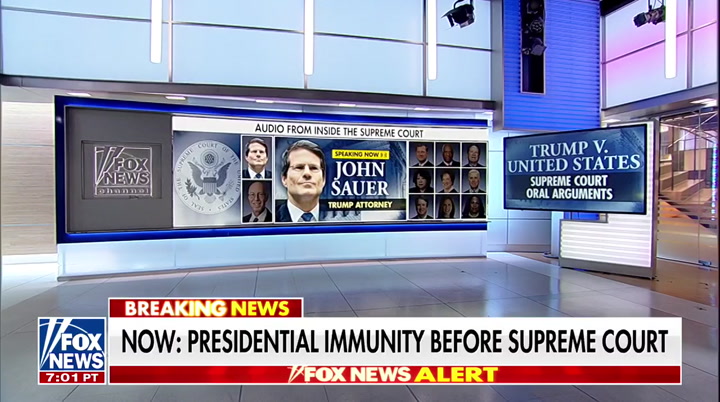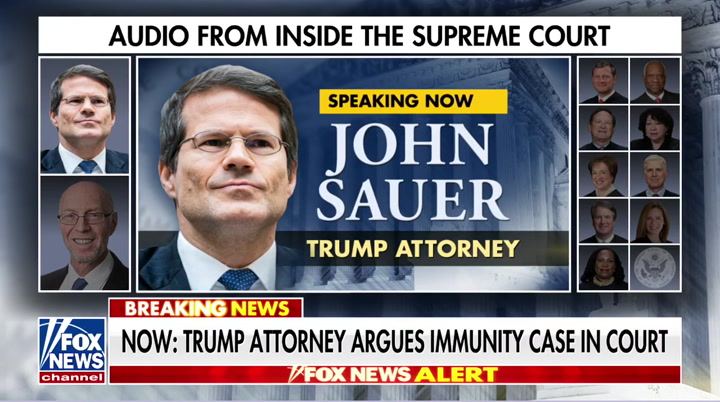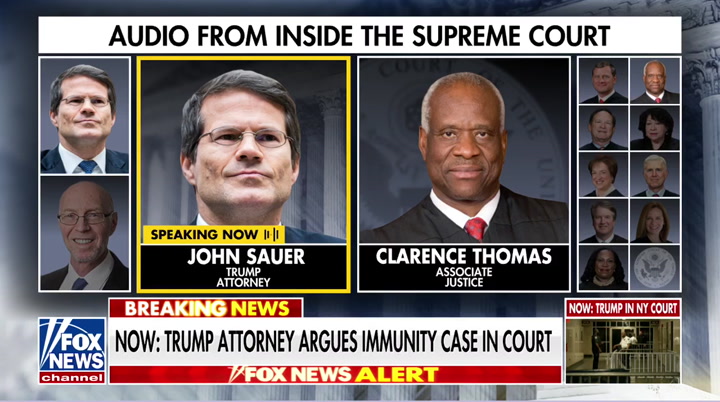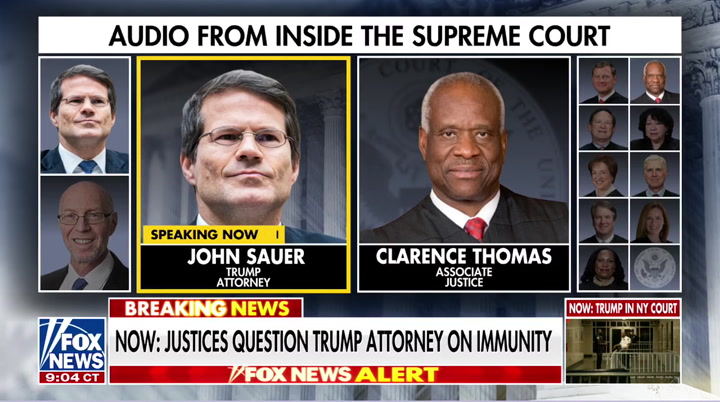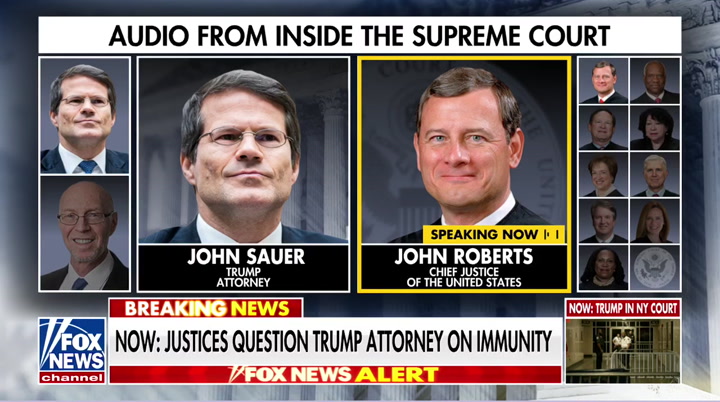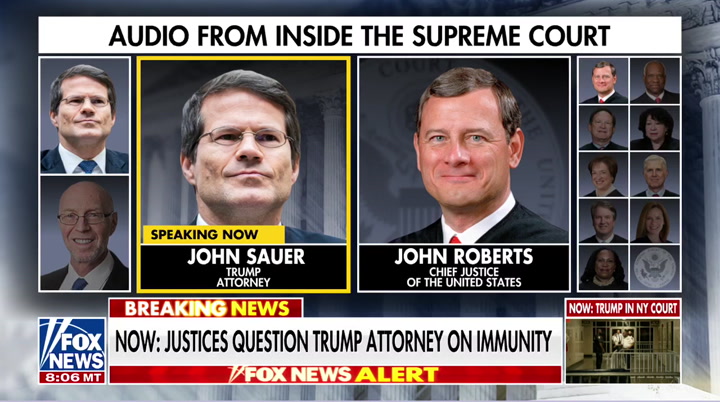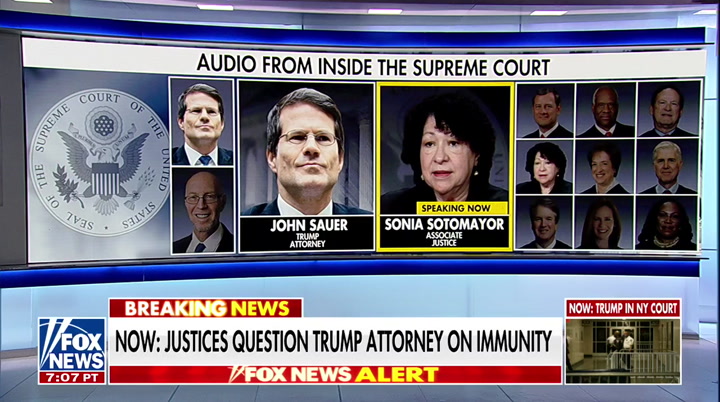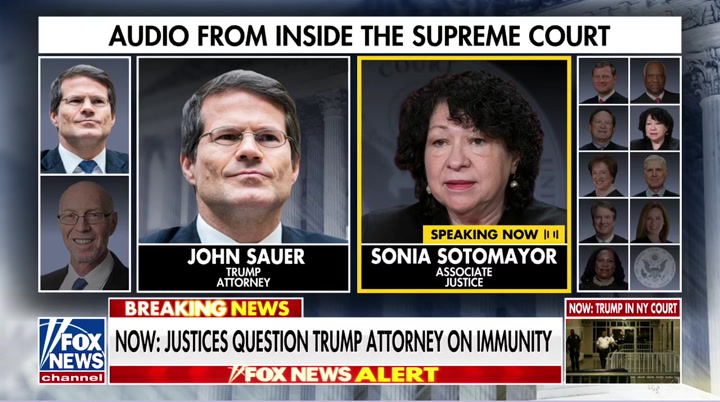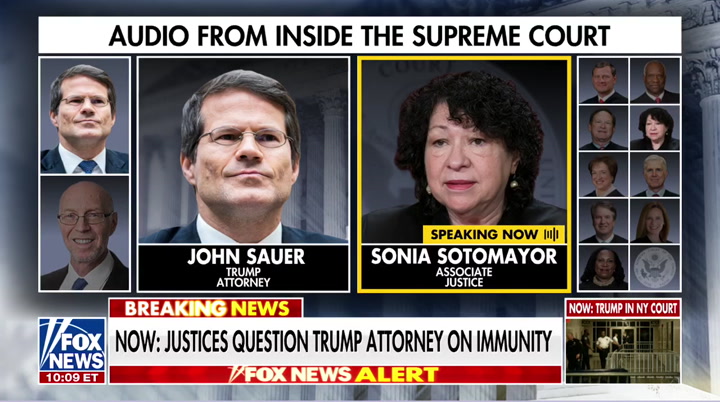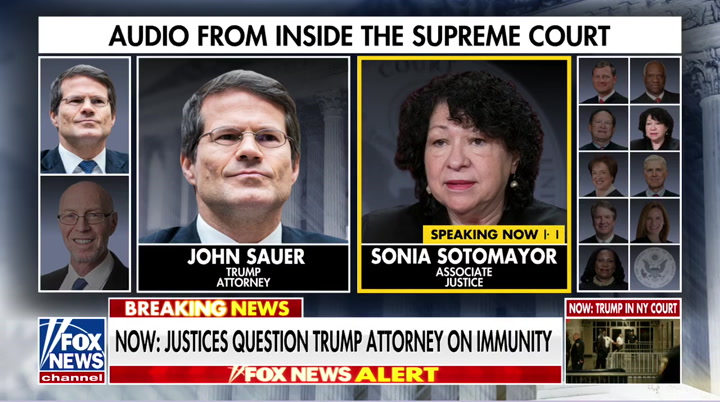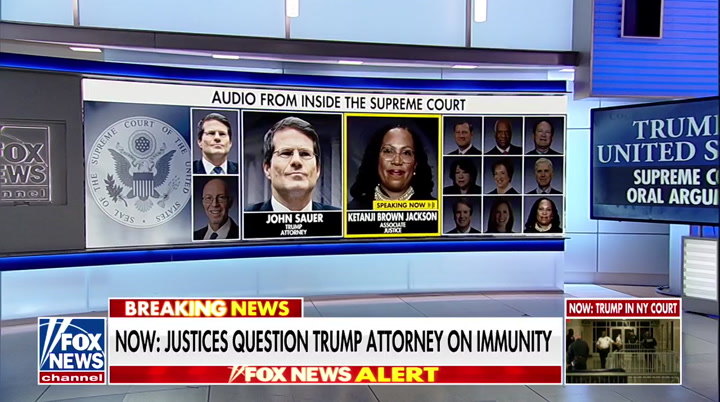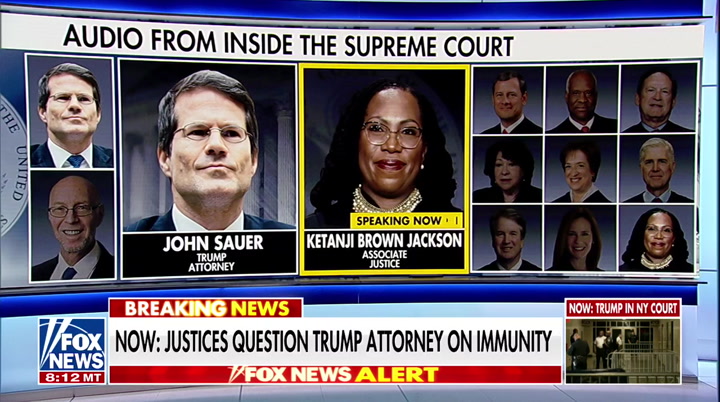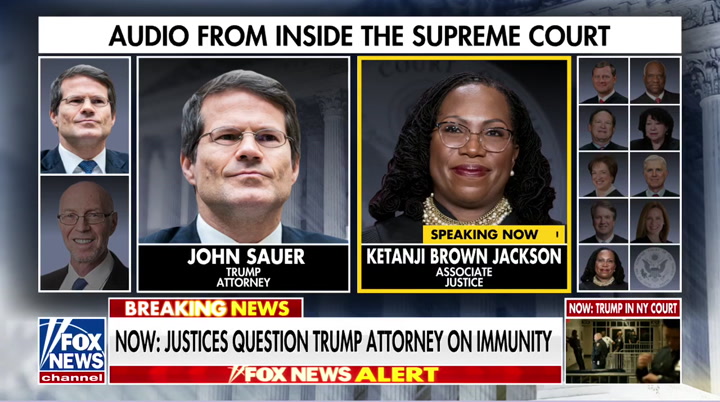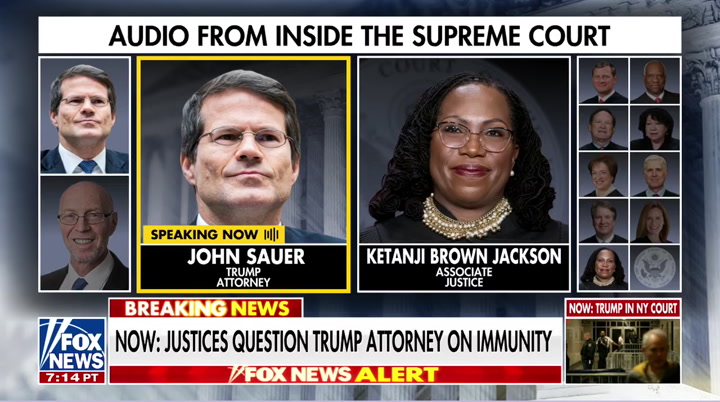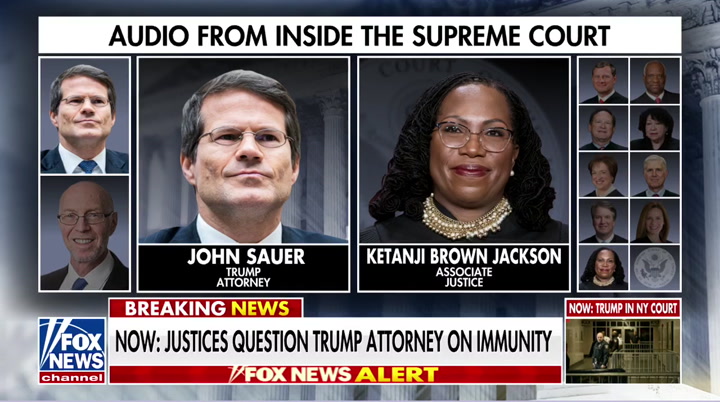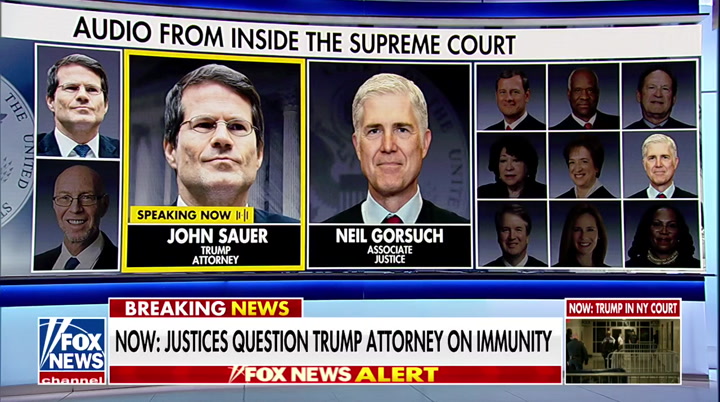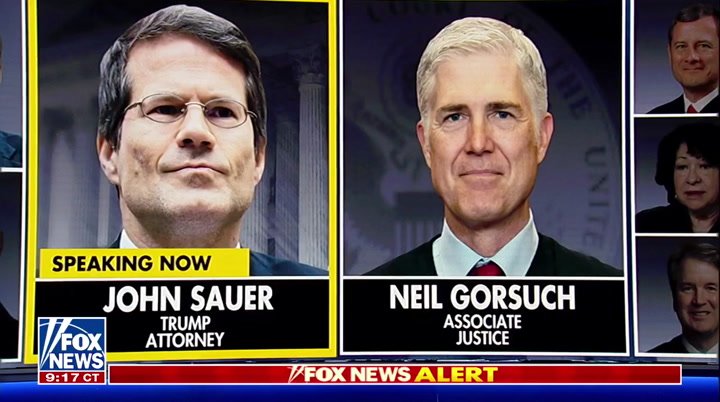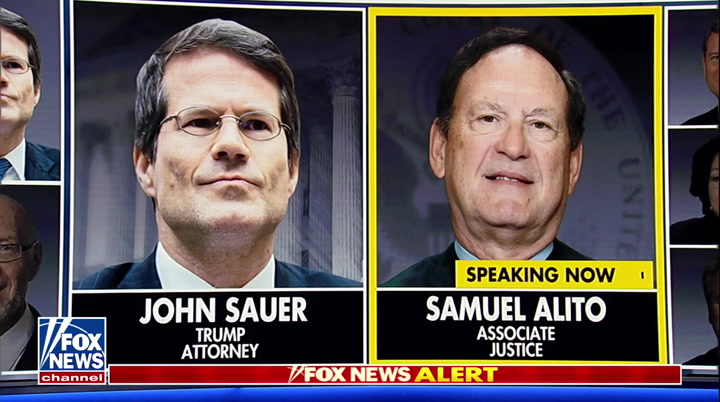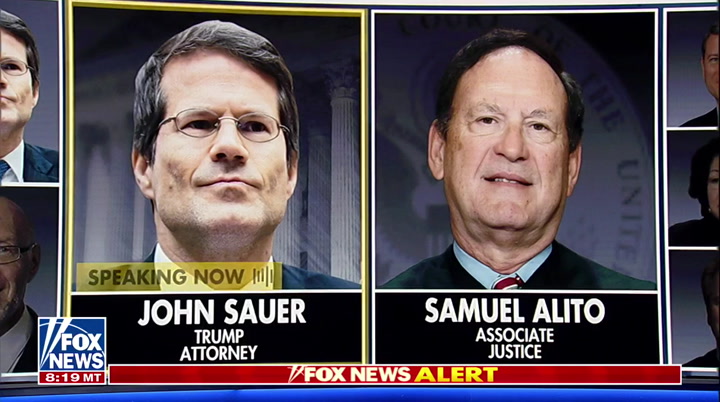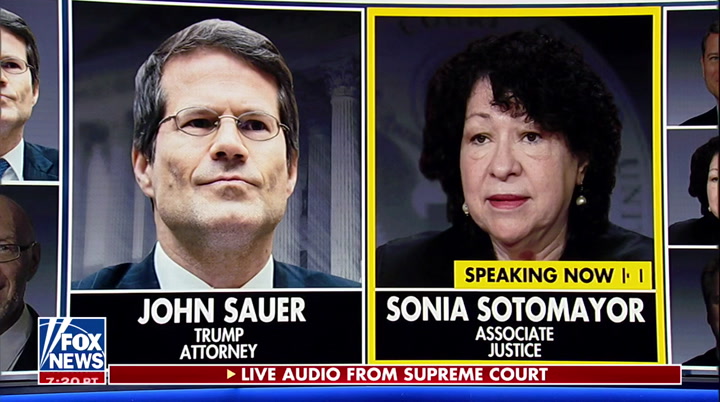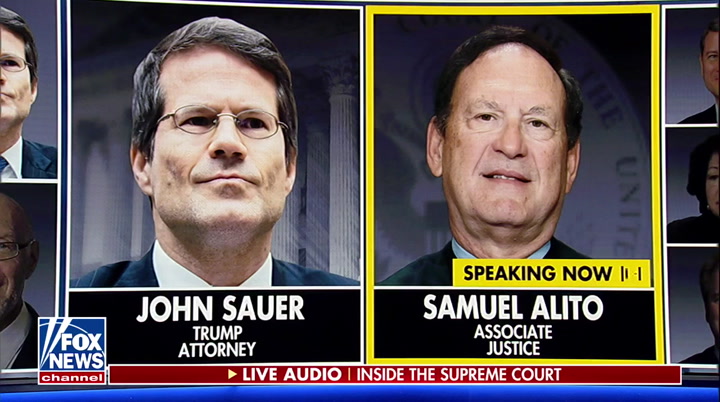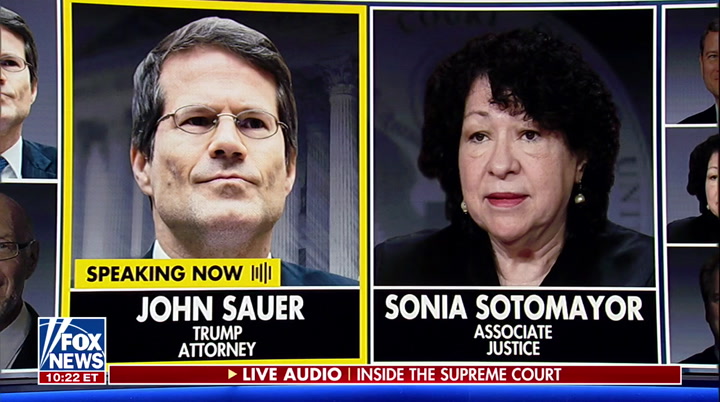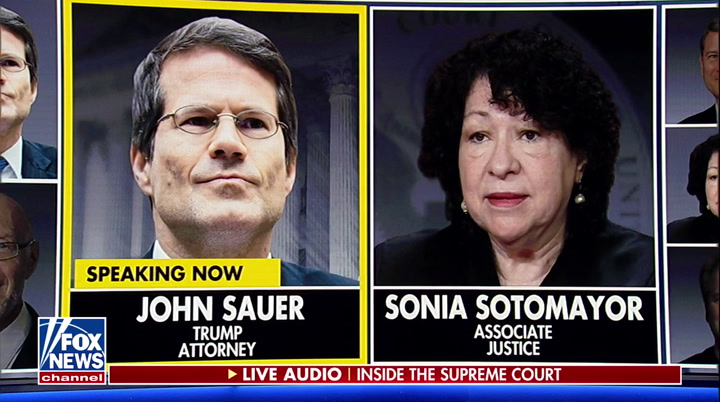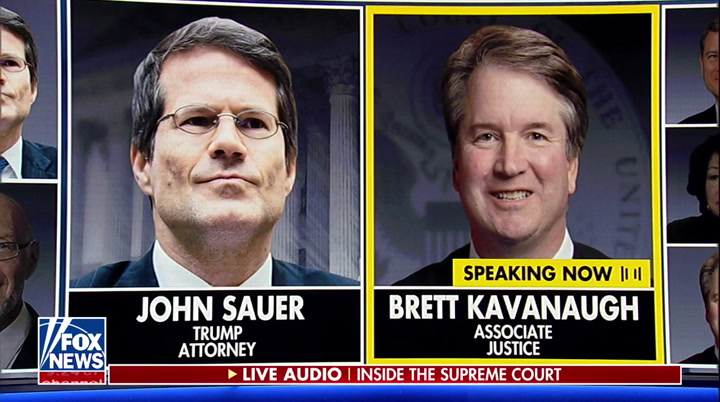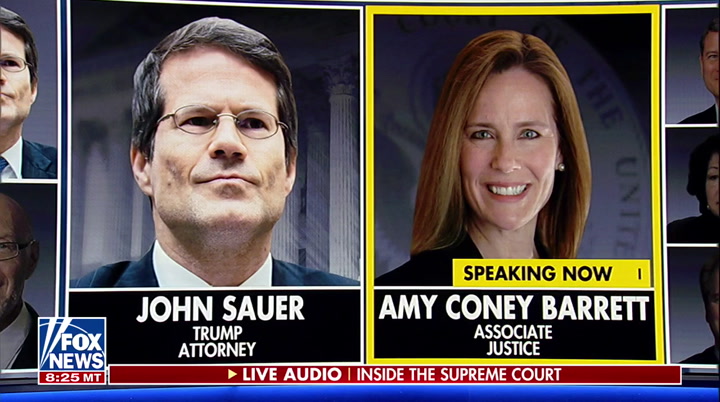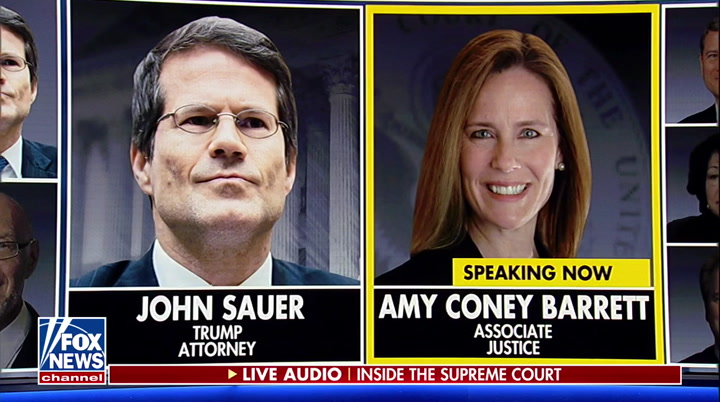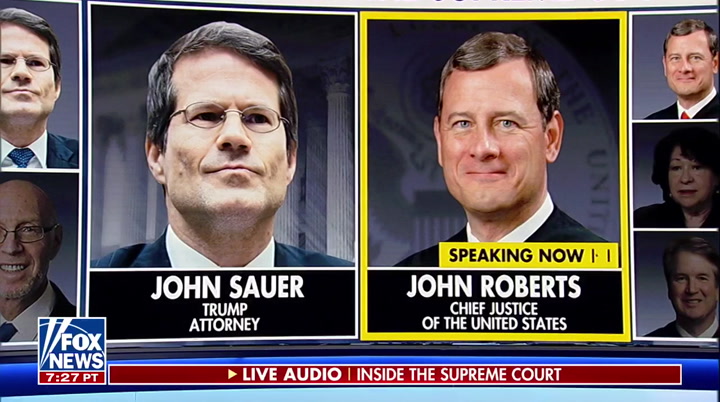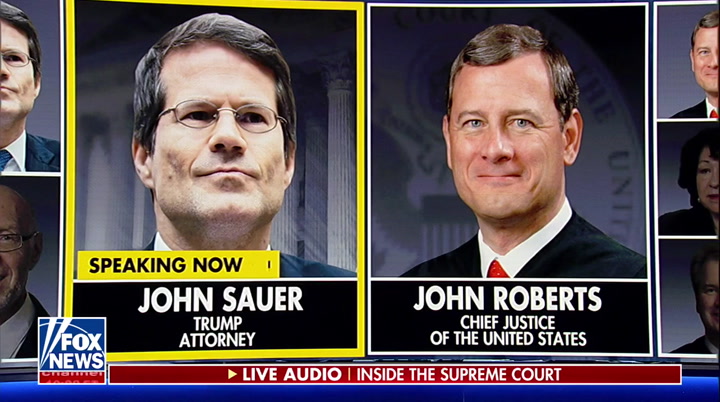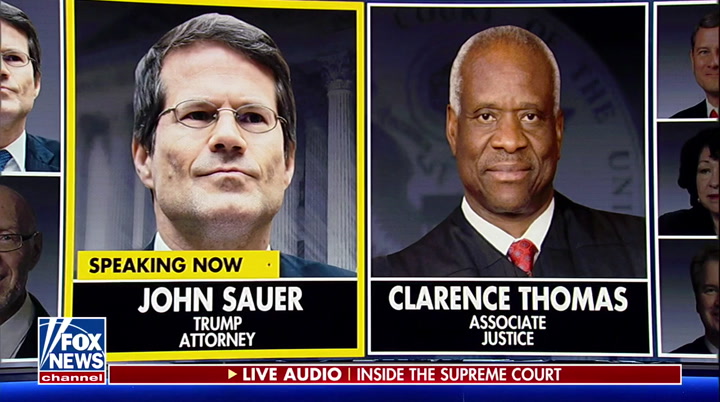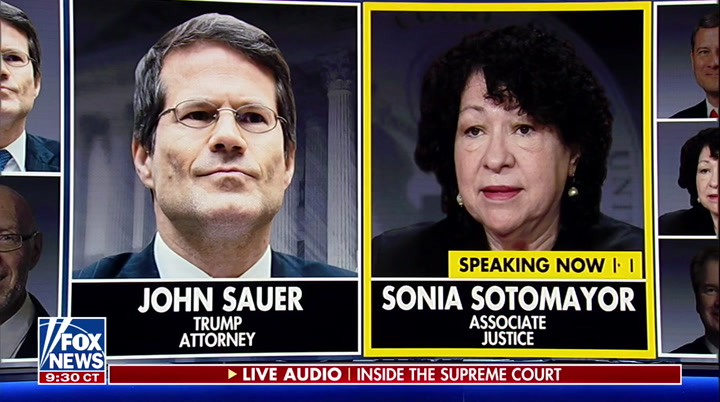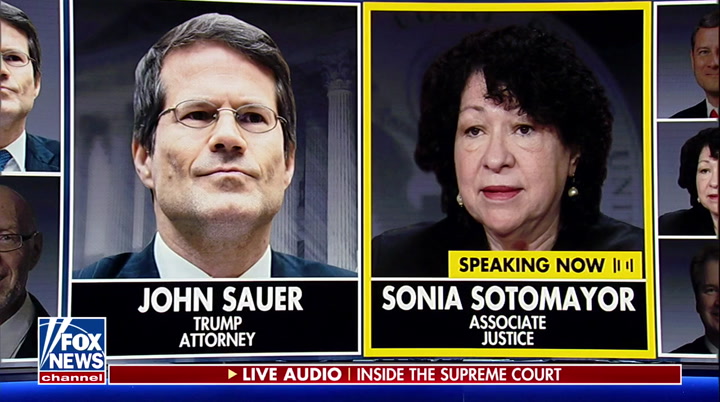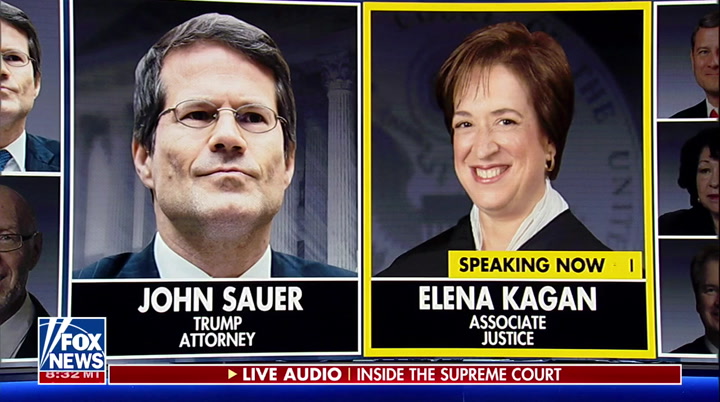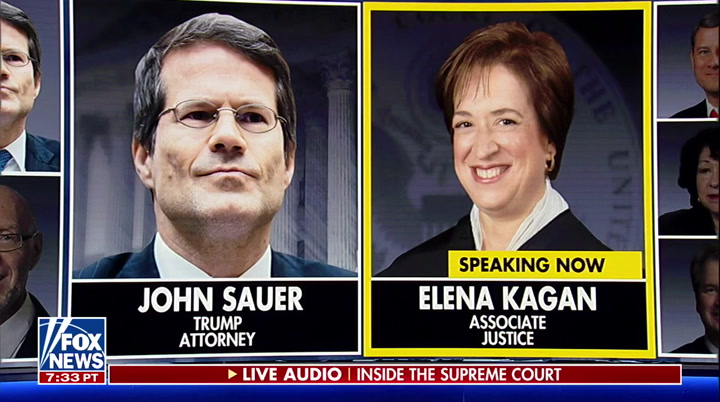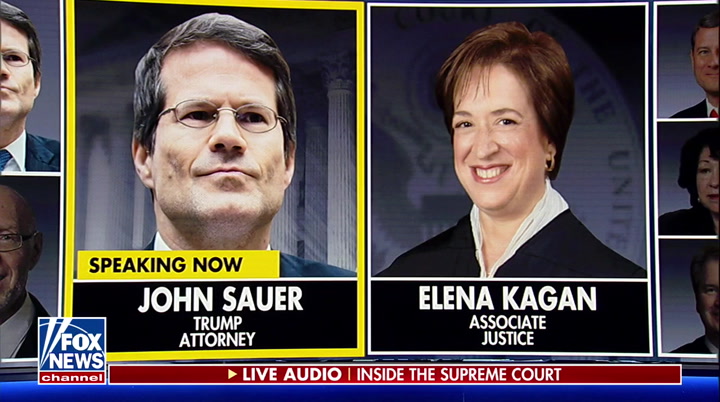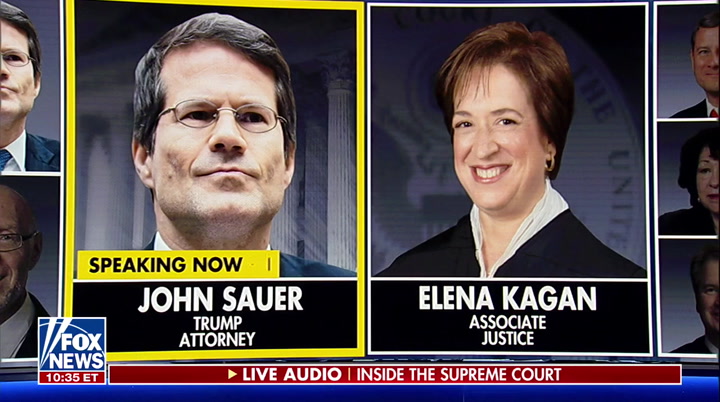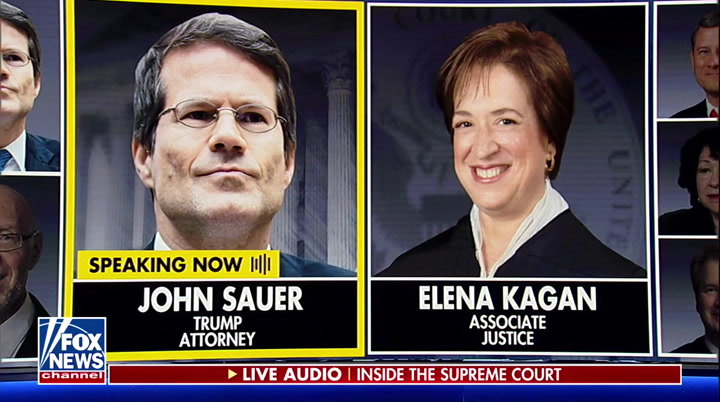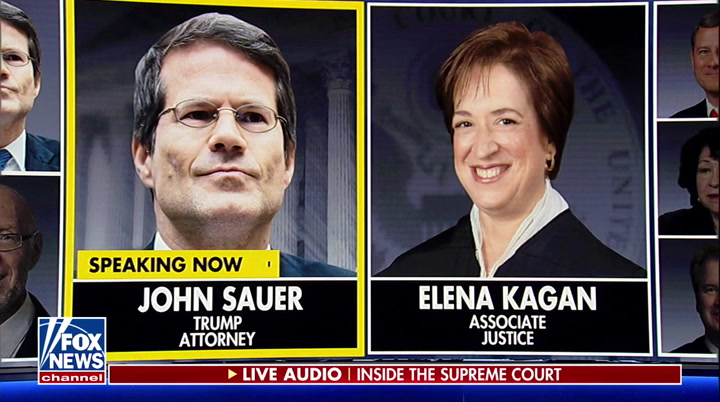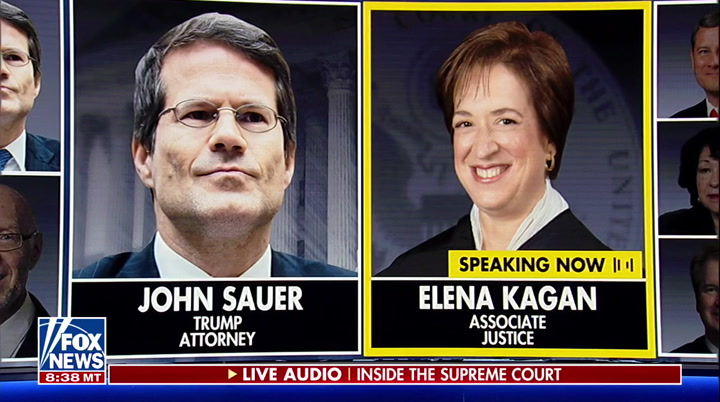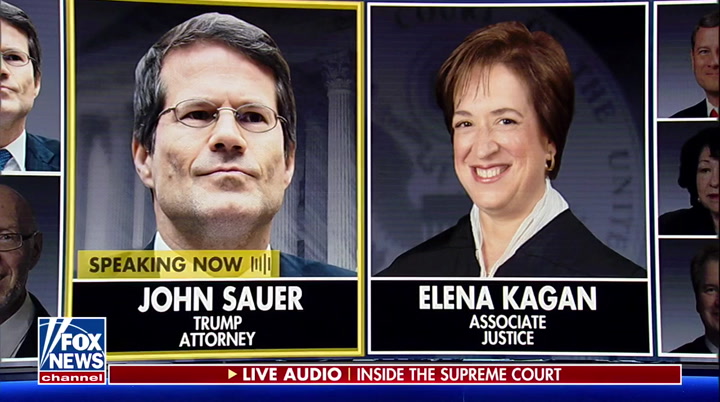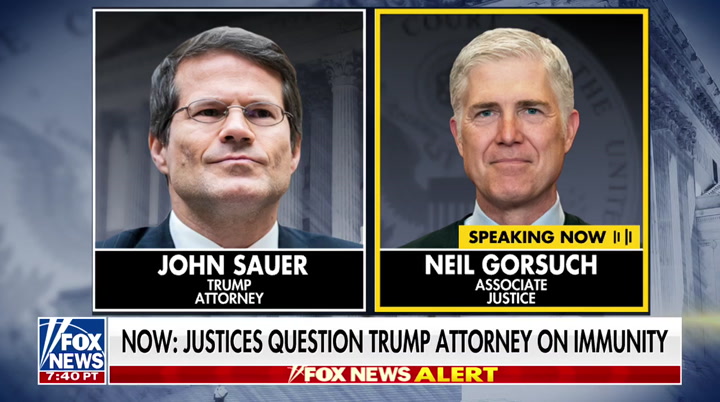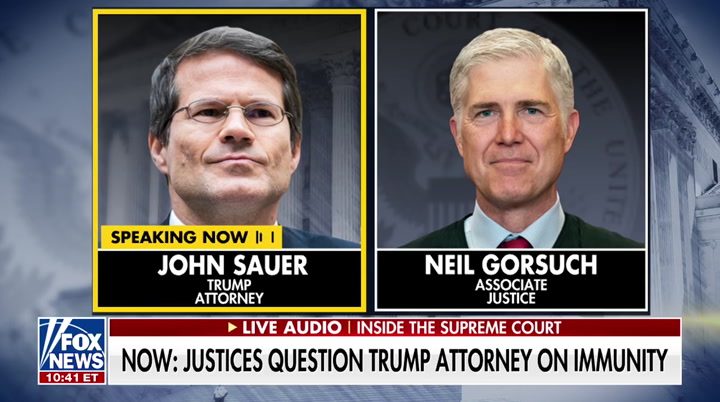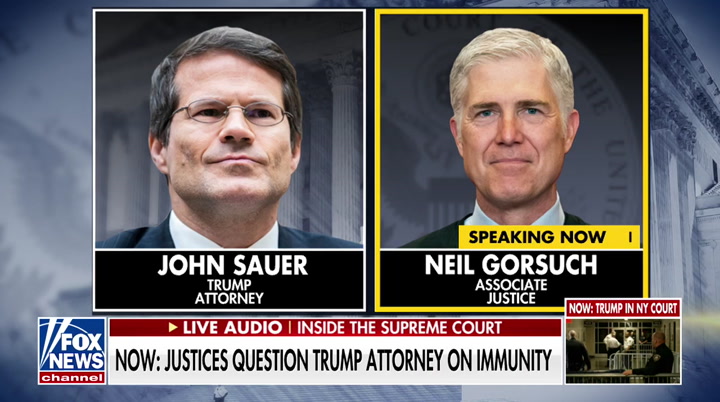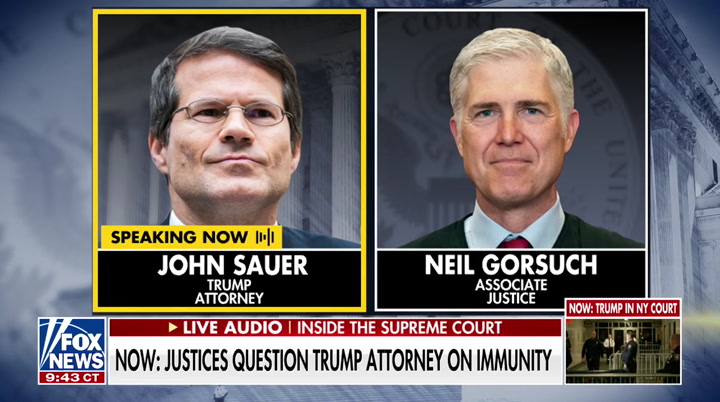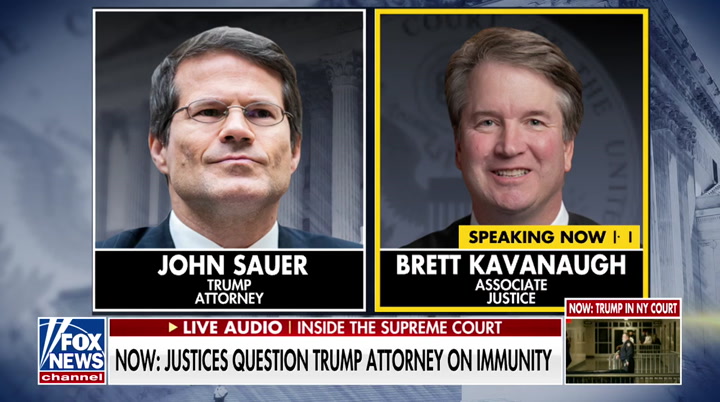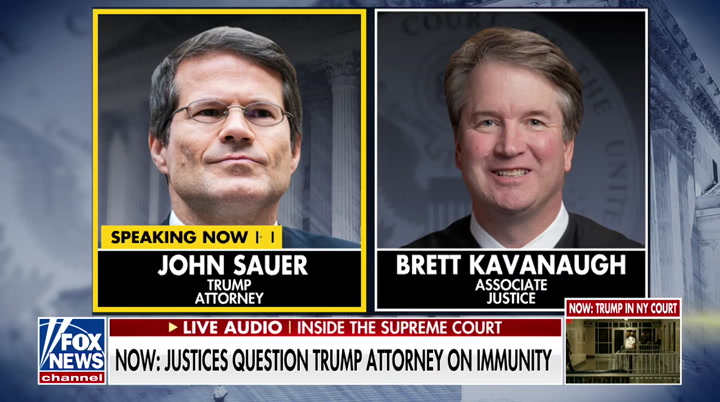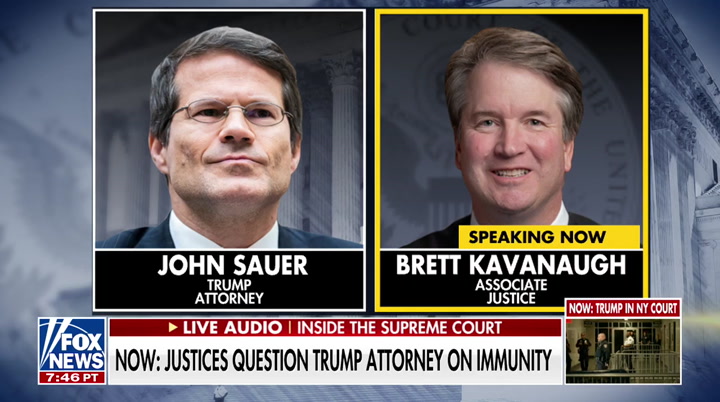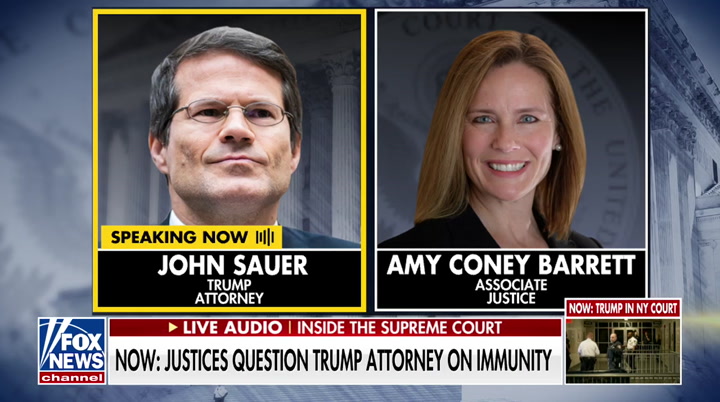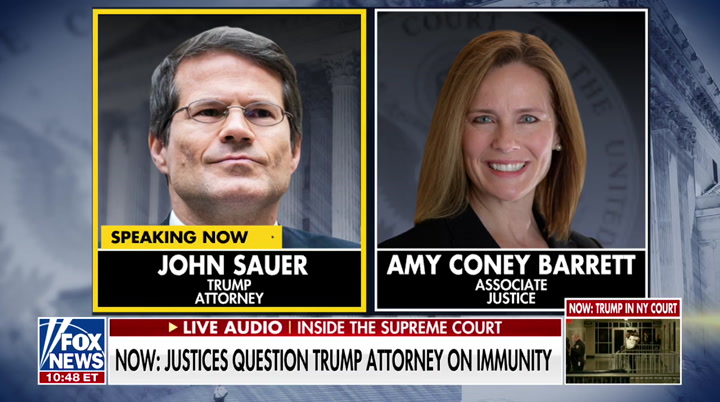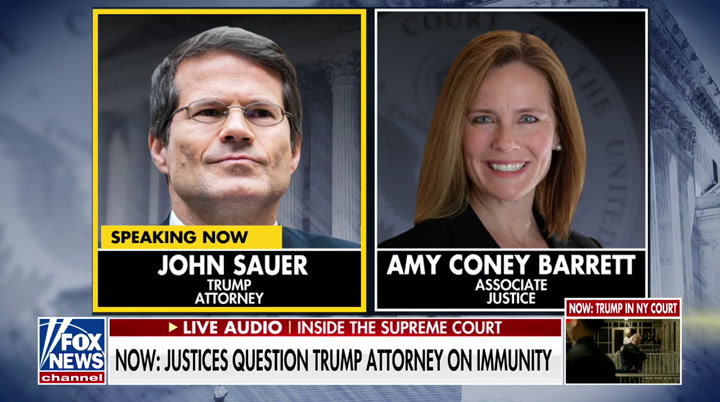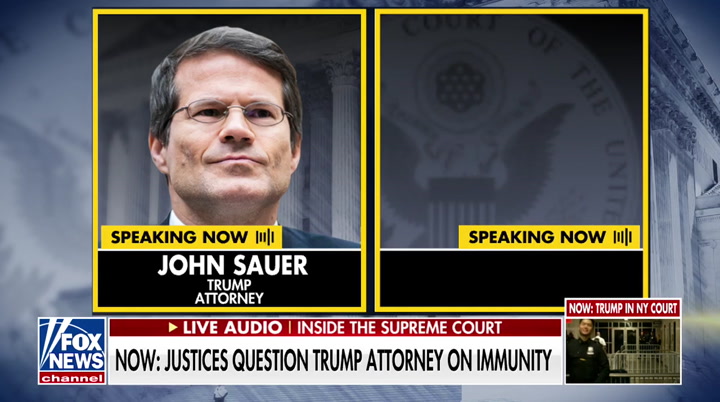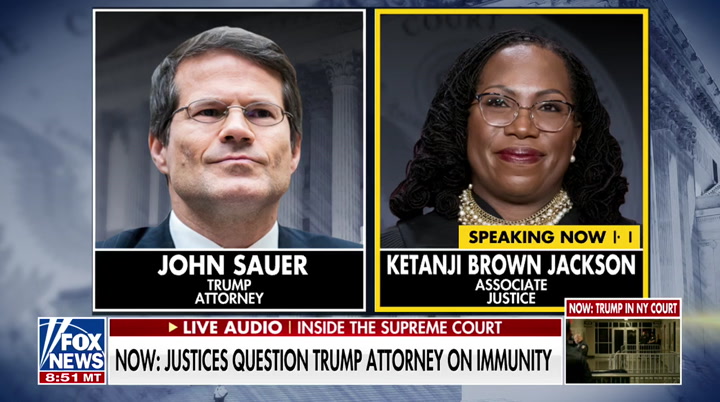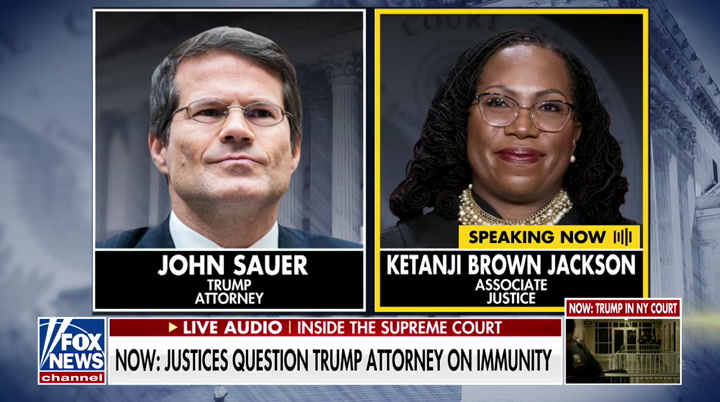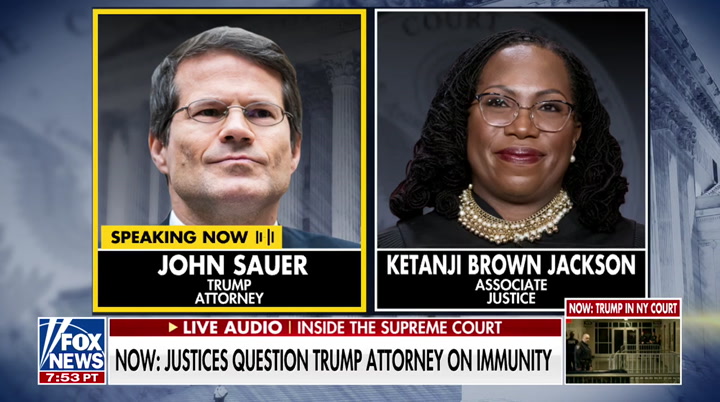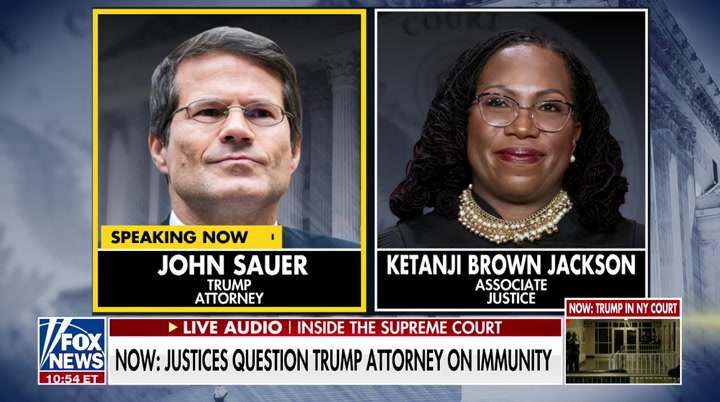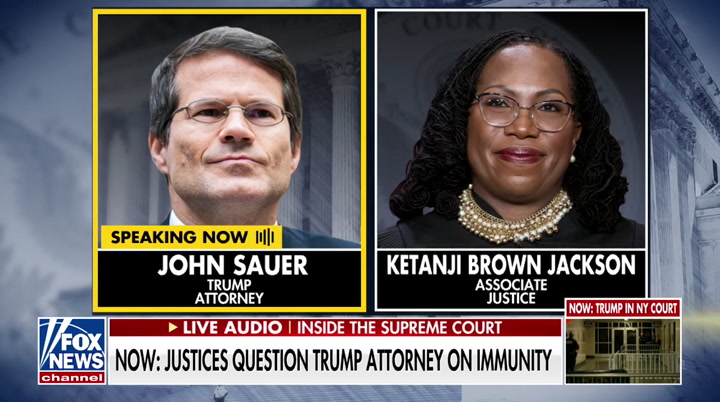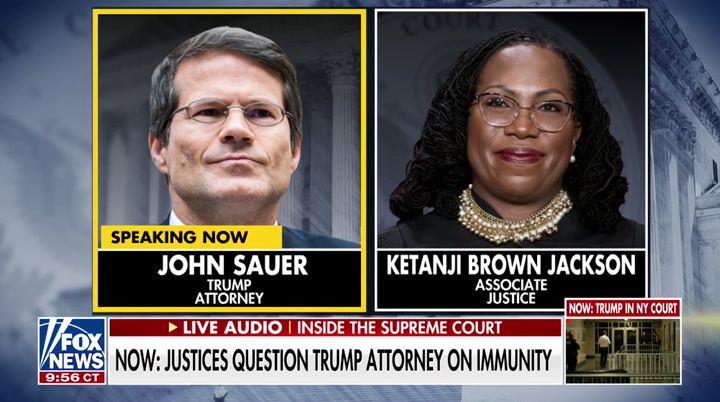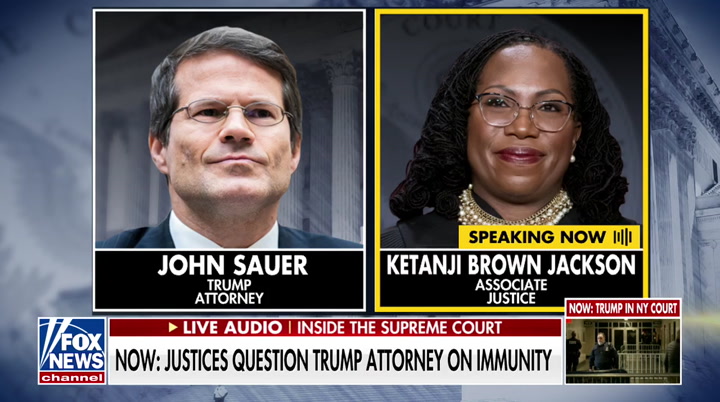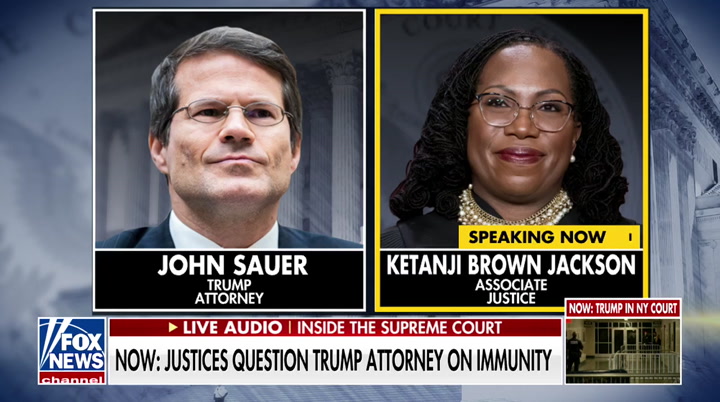tv Americas Newsroom FOX News April 25, 2024 7:00am-8:00am PDT
7:00 am
the outer most limits of their office and i would think the supreme court would go in that direction wanting to give the most deference possible to presidents. but certainly how they decide this will be especially important for donald trump in the short term because it will determine what happens next for him with the jack smith case. does it go away, go forward, or a combination of the two which starts things from square one again and makes things a bit more complicated and delays it until after the election? >> dana: earlier today i asked and he mccarthy a political question. this is about presidents and presidential immunity but election year. if you are the biden white house and biden campaign how do you think they look at this and how do they want the justices to rule? >> i think they would want the justices to rule that the former president was acting not in his official capacity but as an office seeker. but two things.
7:01 am
one is first of all, to some degree this has already been a victory for donald trump because this has delayed the start of the trial by jack smith and as a result has put him in the middle of a political campaign. we have a highly divisive electorate, highly divided with republicans on one side, democrats on the other cheering for their respective squads and as a result, it has energized president trump's base. the campaign reported that they had raised nearly $6 million over a five-day period leading up to this week's event. there has already been a victory for him in this. my suspicion is the biden white house is saying we want him to be held to some level of responsibility for actions that he took while in office but not as the president of the united states. but on the other hand he also like the fact that they are out there able to campaign whether as an explicitly political
7:02 am
candidate or campaign as the president in his official capacity and talk about the things they want to talk about while donald trump is stuck in a courtroom in manhattan going over this and other issues. >> gillian: jonathan, i hear a lot from experts unpacking this case about the impeachment clause. seems that the trump side -- i think we're going to leave it right there, jonathan. oral arguments are beginning over at the supreme court. stand by. >> for 234 years of american history, no president has ever prosecuted for his official acts. the framers of our constitution viewed an energetic executive as essential to securing liberty. if a president can be charged, put on trial, and imprisoned for his most controversial decisions as soon as he leaves office, that looming threat will distort the president's decision making precisely when bold and fearless action is most needed.
7:03 am
every current president will face blackmail and extortions by political rivals while he is still in office. the implications of the court's decision here extend far beyond the facts of this case. could president george w. bush have been sent to prison for obstructing an official proceeding or allegedly lying to congress to induce war in iraq? could president obama be charged with murder for killing u.s. citizens abroad by drone strike? could president biden someday be charged with unlawfully inducing immigrants to enter the country illegally for his border policies? the answer to all of these questions is no. prosecuting the president for his official acts is an innovation with no foothold in history or tradition and incompatible with the constitutional structure. the original meaning of the
7:04 am
executive vesting clause, the framers understanding and intent, in unbroken historical tradition spanning 200 years and policy considerations rooted in the separation of powers all counsel against it. i welcome the court's questions. >> to your last point, could you be more precise as to the source of this immunity? >> the source of the immunity is principally rooted in the executive vesting clause. >> how does that happen? >> the source of it as you describe your separate opinion, the executive vesting clause does not include only executive powers laid out but encompasses all the powers to be included there in. there is this kind of immunity, a broad principle of im --
7:05 am
immunity, that matches the original understanding. >> how exactly would we determine what the -- what an official act is? >> i point the court to two cases for that. fitzgerald against nixon is the best guidance that the court gives, the court adopted the outer perimeter test. this court engaged in analysis there that is instructive here where it looked at the level of specificity where the acts are described in that case a civil case, here the indictment. >> what if you have the official act is appointing ambassador and the president appoints a particular individual to a country but it is in exchange for a bribe, somebody says i'll give you a million dollars if i am made the ambassador to whatever? how do you analyze that? >> it would fall under brewster where the court held that bribery isn't an official act.
7:06 am
the way this court in brewster sliced at the joint was to say accepting the bribe and the agreement to accept the bribe are not official acts. that's private contract. that would be an unre-- >> accepting the bribe but appointing ambassador is within the official responsibilities of the president. how does your official acts or the official acts order boundary come into play when it is going to be official assuming that the president is innocent but the whole question is whether he is going to be found innocent or guilty? >> again, i think brewster and johnson do address that. very persuasively. they say the indictment has to be expunged of all the immune official acts. there has to be determination what is official and what is not. >> you say we are prosecuting him because he accepted a
7:07 am
million dollars. they are supposed to not say what it is for? the what's for part is within the president's official duties? >> we would say independent source of evidence for that. this indictment charges -- what this court described unpresent strictable powers of the president. the logical premise of this indictment is congress by passing vague criminal statues that's purportedly to exercise the employment an removal power, things like his ability to speak directly to the american public. core exercises of his authority under the recommendations clause to recommend to members of congress the measures he thinks necessary and expedient. so you have an indictment in this case that goes right to the heartland of the president's powers that alleges a series of official acts and tries to tie them together by saying there is a private aim or a private purpose in that case and that's a situation which, of course, could be alleged in any indictment.
7:08 am
>> it can be alleged but it has to be proven. it is a concept long viewed as appropriate-in-law. some things are so fundamentally evil that they have to be protected against. now i think -- and your answer below i will give you a chance to say if you stay by it, if the president decides that his rival is a corrupt person and he orders the military or orders someone to assassinate him, is that within his official acts for which he can get immunity? >> we can see it could well be an official act. >> it could, why? he is doing it for personal reasons. he is not doing it at like president obama is alleged to have done it, to protect the
7:09 am
country from a terrorist. he is doing it for personal gain. and isn't that the nature of the allegations here? that he is not doing them -- doing these acts in furtherance of an official responsibility but doing it for personal gain? >> i agree with that katie couricization of the indictment and confirms immunity. there is a series of official acts done for a -- >> no, immunity says even if you did it for personal gain, we won't hold you responsible. what -- how could that be? >> that's an extremely strong doctrine in this court's case law in cases like fitzgerald. >> we go back to justice thomas's question where does that come from? it tells us the founders talked about whether to grant immunity
7:10 am
to the president and, in fact, they had state constitutions that granted some criminal immunity to governors. and yet they didn't take it up. instead they pass an impeachment clause that basically says you can't remove the president from office accept by a trial in the senate, but you can impeachment after. so or you can impose criminal liability. we would be creating a situation in which we would be saying, this is what you are asking us to say, which is that a president is entitled not to make a mistake, but more than that, a president is entitled for total personal gain to use the trappings of his office. that's what you are trying to
7:11 am
get us to hold. without facing criminal liability. >> i would say three things in response to that. first, the doctrine that immunity does not turn on the allegedly improper motivation or purpose is something this court has reaffirmed in at least nine or ten. >> qualified immunity does say that whatever act you take has to be within what a reasonable person would do. i am having a hard time thinking that creating false documents, that submitting false documents, that ordering the assassination of a rival, that accepting a bribe, and countless other laws that could be broken for personal gain, that anyone would say that it would be reasonable for a president or any public official to do that. >> your honor as this court said in fitzgerald the allegation that this particular act would be done for an unlawful purpose
7:12 am
or was unlawful could be made in any case. if that was the doctrine, the allegation of improper purpose is what deprives the objectives of their immunity the immunity would have no purpose. >> isn't the work, though, of the improper motive, at least in the absolute immunity context, to tell us what are official acts and what are not? i understood that even -- first of all your ask is absolute immunity, is isn't it >> bill: absolute immunity? my understanding what we say that we mean for their official acts. is that right? >> yes. >> okay. any official acts. then in that world, the real decision making from the court standpoint is whether or not something is an official act or
7:13 am
not, correct? >> that is an important determination by all means. >> that's the determination in the absolute immunity world because if you determine that it is an official act the principle is you get immunity for it, correct? >> that's correct. >> my question and the chief justice may have asked this at the beginning how do you determine or maybe justice thomas, how do you determine what is an official act? when we are talking about the kinds of scenarios that just sis sotomayor brought up one could say when the president is using the trappings of his office to achieve a personal gain, then he is actually not acting officially, even if the doctrine was absolute immunity. what do you say about that? >> two things in response. first in the last point that allegation that this was really motivated by an improper private purpose could be made in every single case. >> i understand that but it would have to be made. i'm trying to assess. even if we had the doctrine of absolute immunity, that same allegation and the facts related
7:14 am
to it would come in because the personal would be arguing that he was not acting in his official capacity, he wasn't doing something official, he was doing it personal, correct? >> i agree the objective -- the point i would make in response in fitzgerald against nixon this court emotion fay sillsed it would result in intrusive of the president's motives for every official act. >> another quick question before my colleagues take it over here. at the beginning of your analysis when you were giving your opening statements, you were talking about you suggested that the lack of immunity and the possibility of prosecution in the presidential context is like an innovation. i understood it to be the status quo. i understood that every president from the beginning of time essentially has understood that there was a threat of
7:15 am
prosecution if for no other reason than the constitution suggests they can be prosecuted after impeachment, that the office of legal counsel has said forever that presidents are am enable to a threat of prosecution and they have continued to function and do their jobs and do all the things that presidents do. so it seems to me that you are asking now for a change in what the law is related to immunity. >> i would quote from what benjamin franklin said at the constitutional convention which is the founder's original intent. at the constitutional contention he said history provides one example only of a chief magistrate subject to public justice, criminal prosecution and everybody cried out against that. >> i understand. since benjamin franklin everybody has thought they were taking this office subject to potential criminal prosecution, no? >> i see the opposite.
7:16 am
i see all the evidence going the other way. mississippi against johnson discuss this broad immunity principle. >> what was up with the pardon for president nixon? if everybody thought that presidents couldn't be prosecuted, what was that about? >> he was under investigation for private and conduct and official acts. the president since president grant's carriage riding incident everyone has understood the president could be prosecuted in -- >> there does seem to be some common ground between you and your colleague on the other side that no man is above the law and that the president can be prosecuted after he leaves office for his private conduct. is that right? >> we agree with that. >> and then the question becomes, as we've been exploring today about how to segregate private from official conduct that may or may not enjoy some immunity and i'm sure we'll
7:17 am
spend a lot of time exploring that. but the d.c. circuit in blazing game, the chief judge there joined by the panel expressed some views about how to segregate private conduct, for which no man is above the law, from official acts. do you have any thoughts about the test that they came up with there? >> yes, we think in the main test if it's understood through the lens is a persuasive test and a great source for this court to rely on. it talks about how actions that are plausibly connected to the president's official duties are official acts and also emphasizes if it's a close case or it appears there is considerations on the other side, that also should be treated as immune. those are the aspect of that we would emphasize and guiding the courts. >> that left open the possibility of further
7:18 am
proceedings and trial. >> exactly right. that would be a very natural course for this court to take in this place. the court can and should reverse the categorical holding of the d.c. circuit no such thing as official acts. >> you would agree further proceedings would be required. >> that's correct. i would point the court to anderson. two stages of these further proceedings. looking at the indictment itself. a complaint. look at the charging document itself and see whether or the face of it, alleging official acts. if not or can't be determined there would be a factual proceeding and all of that under mitchell would have to occur before any other proceedings in the district. >> mr. sauer, you began by explaining why you believe that immunity from criminal prosecution is essential for the proper functioning of the presidency. but my question is whether the very robust form of immunity
7:19 am
that you are advocating is really necessary in order to achieve that result? just to take one possible alternative. suppose the rule were that a former president cannot be prosecuted for official acts unless no plausible justification could be imagined for what the president did, taking into account history and legal precedent and the information that was provided to the president at the time when the act was taken. would that be sufficient or if it is insufficient, why would it be insufficient? >> that might be a much better rule than what emerged in the lower courts here. we believe it would be inefficient. using the president's motives and intrusive consideration of the president's motives as
7:20 am
official and unofficial would come into play. of course, once you can make that allegation, all of a sudden you have opened the door and no longer have a per se clear rule, you have a determination at every single case. >> what if it did not involve any subjective element but purely objective. you would look objectively at the various relevant factors. >> that sounds to me a lot like blazing game and that i may not be different. >> well that case had to do with the difference between official conduct and private conduct, right? >> that's right. i understood the court to be asking that. >> no, this would apply -- just a possibility. i don't know whether a good or bad idea or derived from the structure of the constitution or vesting clause or any other source, but this would be applied in a purely objective grounds when the president
7:21 am
invokes an official power taking the action at issue. >> the reason i think of that case it is a determination to winnow out what is official and private conduct and with a strong degree of deference to -- >> i'm sorry, if i understood justice alito he is suggesting not that. he is suggesting whether even if it is an official act, whether you still grant immunity if that act is not plausibly viewed as within the realm of law. he can correct me if i'm wrong. >> that was the question. >> that i think would be a superior rule than the categorical denial that emerged in the trial court here. >> i am not sure where he used the word plausible. that seems to negate -- might as
7:22 am
well give absolute if you say plausible. anybody could argue plausible. we require reasonable in qualified immunity. >> one might argue that it isn't plausibly legal to order seal team six -- i don't want to slander seal team six but they are honorable officers and they are bound by the uniform code of military justice not to obey unlawful orders. i think one could say it is not plausible that that is legal. that that action would be legal. i'm sure -- i have thought of hypotheticals and i'm sure you have, too, where a president could say i'm using an official power and yet the president uses it in an outrageous manner. >> that objective determination
7:23 am
may well be an interesting approach to take. >> so apply it to the allegations here. what is plausible about the president assisting in creating a fraudulent slate of electoral candidates, assuming you accept the facts of the complaint on their face, is that plausible that that would be within his right to do? >> absolutely. we have historical precedent we cite in the lawyer courts of federal grant sending federal troops to mississippi and louisiana to make sure republican electorals got certified. the notion that it's completely implausible can't be support evidence by the face. >> knowing that is slate is fake. that they weren't actually elected or weren't certified by the state.
7:24 am
he knows all those things. >> the indictment itself -- i dispute that characterization. the indictment affixes the word label to the fraudulent -- that's a complete mischaracterization. on the face of the indictment there appears to be no -- this was being done as an alternative basis. i want to stress a fundamental point as justice alito's question indicated there is a whole series of structural checks other than criminal prosecution designed to deter these kind of outlandish scenarios or illegal things. that's been viewed in this court's opinions going back to -- >> where do you think the d.c. circuit went wrong in how it determined what was official versus what is personal? >> i read the opinion below in this particular case as adopting a categorical view. it doesn't matter is the logic of their opinion because there is no immunity for official acts
7:25 am
and therefore, you know, that's the end of the story. i don't really think they went wrong in the civil context when they engaged in the same determination with determination of what is or isn't official. we agree with that. >> some official acts that are not within the article ii exclusive power. so official acts but not within the article ii exclusive power, even for those you would think a clear statement has to be required, a clear statement in the statute covering the president if the president's official acts are going to be cri criminal ized. >> absolutely. as in in indictment the allegation. >> i assume the exclusive powers are walled off and can't be prosecuted before there is a lot of official powers that are not exclusive to the president under his article ii authority.
7:26 am
for those i understood you to be saying at a minimum there would need to be a clear statement in the statute referencing the president so that the president is on notice and can conduct himself or herself accordingly. >> absolutely correct. that would be consistent franklin and public citizens and a long series of other clear statements. >> can i follow up on that? so you concede that private acts don't get immunity. >> we do. >> in the special counsel's brief on pages 46 and 47, he urges us even if we assume that there is -- even if we were to decide or assume there was some sort of immunity for official civil acts but -- i want to know if you agree or disagree about the characterization of these acts as private. petitioner turned to a private attorney. spread false claims of election fraud to spearhead challenges to the election results. private?
7:27 am
>> we dispute the allegation. that sounds private. >> petitioner conspired with another private attorney who caused the filing in court of a verification that contained false allegations to support a challenge. >> sounds private. >> private actors to attorneys thought mentioned about and political consultant to obstruct the certification proceedings and attorney directed that effort. >> you read it quickly. i believe that's private. >> those acts you would not dispute. those were private and you wouldn't raise the claim they were official. >> what we would say is official is meeting with the department of justice to deliberate who will be the acting attorney general of the united states. communicating with the american public, communicating with congress with matters. >> thank you. >> and what is the consequence in terms of going forward with your acknowledgement that those are private acts as opposed to
7:28 am
official acts? >> if you look at the indictment here there is a bunch of thakts are clearly official. there may be allegations that mostly relate to the government described as private aim or private end and the court should remand or address itself but remand for brewster-like determination. what is official and what's private? the official stuff has to be expungesed from the indictment before the case can go forward and a determination on what is official two stage determination of what's official and what is private? >> if you expunges the official part from the indictment it is a one legged stool. giving somebody money isn't bribery is if you get something in exchange. if you become the ambassador to a particular country, that's official in the president's prerogative. the unofficial part is i'll get a million dollars. if you say you have to expunge the official part, how does that go forward? >> this particular indictment we
7:29 am
say all the overconduct is official. we don't believe it would be able to go forward. there could be a case it would. if you look at the government brief divides the indictment things other than the electors allegations don't really -- they haven't disputed that they are official acts. what they do they say we tie it together by characterizing as done and these are the allegations that the court just referred to by an improper private aim or private end. that's their words and runs lager heads dead set against this court's case. the motive or purpose. >> in assessing the official acts of a president do you differentiate between the president acting as president and the president acting as candidate? >> yes, we do.
7:30 am
we don't dispute essentially the case discussion of that. that has to be done by objective determination. not what was the purpose. that's the most important point there. >> did you in this litigation challenge the appointment of special counsel. >> not directly. we did in the southern district of florida case and agree by attorney general meece and mukasey and points to an issue here. one of their arguments is that we should have this presumption of regularity that runs into the reality here in extraordinary prosecutorial power exercised by someone never nominated by the president or confirmed by the senate at any time. so we agree with that position. we hadn't raised it in this case when this case went up on appeal. >> when you say that the official acts should be expungesed from the indictment. that in itself would not achieve
7:31 am
very much unless evidence of those official acts were precluded at trial. is that what you are saying that prosecution should not be permitted at trial to prove the official acts with the conspiracy >> absolutely. that's the clear applications in the cases in their context. >> i'm a little confused by that. if you have a scheme to defraud or a scheme to accept bribery, there is evidence from which you can infer that scheme and one of it is that the appointment actually happened. it is an official act. you wouldn't expunge that as evidence. you would instruct the jury that there is no liability for the actual appointment. that the liability is for accepting the bribe. similarly here, i don't think the indictment is charging that
7:32 am
the obstruction occurred solely because of conversations with the justice department. they are saying you look at all of the private acts and you look in the context of some of the public acts and you can infer the intent, the private intent from them. so i'm not sure that i understand why your problems couldn't be taken care of at trial with an instruction, if we believe -- if the court were to find -- i'm not sure how they could -- if it were to find that some public acts could not be the basis of criminal liability? >> the best thing i can say to that is -- i think this ties into the chief justice's question about the one-legged school. cases essentially say that, that this is a one-legged stool
7:33 am
problem and difficult for some of these prosecutions to proceed and the implications of official immunity dictated in the constitution here by the executive vesting clause. >> to continue on in justice barrett's vein and ask you about some of the allegations of the indictment and whether they are official acts or not in your view. so the defendant signed a verification affirming false election fraud allegations made on his behalf in a lawsuit filed in his name against the georgia governor. >> i don't think we've disputed that's official. -- that is unofficial. >> that's unofficial. same for the defendant called the chairwoman of the republican national commity and targeted states falsely -- votes used only if ongoing litigation changed the results in the defendant's favor. >> we have taken position that's official. >> that's official? >> yes. >> why would that be official?
7:34 am
>> the organization of alternate slates of electors is based on the historical example that president grant something that was done pursuant to and preparatory to the exercise of the core recommendation clause power. so when president -- >> couldn't he have taken this action just in the status of a candidate? >> the fact he could have done so doesn't demonstrate he did in this case. based on the allegations we think it is clear he did not. it was done in an official capacity. >> the defendant asked the arizona house speaker to call the legislature into session to hold a hearing based on their claims of election fraud. >> enormous federal interest and concern attempting to defend the integrity of an election to urge state officials what he views as their job under state and federal law. that's an official act. >> attempting to defend the
7:35 am
integrity of the election. the allegation is he was attempting to overthrow an election. >> it should make a difference whether it's immune. that's extremely strong precedent from this court. >> does it strike you as odd that your understanding of immunity goes way beyond what olc has ever claimed for the former president? >> i view the olc supporting us. any type a congressional statute got near touching the president's prerogatives we'll interpret the statute narrowly to avoid that. >> that's a different question. what that has said is sitting presidents get immunity but former presidents, no. now there might be a different argument made about whether a statute or whether a statute as applied to particular conduct is
7:36 am
properly available against the president but that's a very different argument than the immunity claim that you are making here, which olc has definitively not supported. >> i don't know if i would put it that way. i don't recall an opinion addressing that. more fundamental to us is the language of cases like marbury and statements made by benjamin franklin and how it could destroy the government. that's what we rely on here. i cite the olc opinions. what you see a a strong trend if there is any statute that might stren much on the president's prerogatives, they interpret it to avoid that. >> if a president sells nuclear secrets to a foreign adversary, is that immune? >> likely not immune.
7:37 am
structured as an official act he would have to be impeached and convicted first. >> i don't know in the hypothetical whether it would be an official act. more details to apply the case analysis or even the fitzgerald analysis. >> how about if a president orders the military to stage a coup? >> i think that as the chief justice where there is a series of guidelines against that, so to speak, ucmj prohibits the military. if one adopted alito's test it would fall outside. the fitzgerald case might be an official act. all these kinds of hype that calls has been top impeached and convicted. >> he is gone, let's say the president who ordered the military to stage a coup. no longer president.
7:38 am
wasn't impeached and couldn't be impeached but he ordered the military to stage a coup and you are saying that's an official act? >> i think it would depend. >> that's immune. >> it would depend on the circumstances. if it were an official act he would have to be impeached. >> what does it mean depend on the circumstances? he was the president and is the commander-in-chief, he talks to his generals all the time and he told the generals i don't feel like leaving office. i want to stage a coup. is that immune? >> if it's an official act there needs to be impeachment and conviction beforehand because the framers viewed that kind. >> it's an official act? >> if it's an official act. >> is that an official act? >> if you describe that hypothetical it could well be. it is a fact-specific content. >> that answer sounds to me as though under my test it is official act but it sure sounds bad, doesn't it >> it sound very bad and why the
7:39 am
framers have a whole series of structural checks that have successfully for the last 234 years prevented that very kind of extreme hypothetical and that is the wisdom of the framers. what they viewed as the risk that needed to be guarded against was not the notion that the president might escape criminal prosecution for something very unlikely. the viewed much more likely and destructive to the republic the risk of factional strife. >> they do not put an immunity clause into the constitution. there were some immunity clauses in some state clauses. they didn't provide immunity to the president and not so surprising, they were reacting against a monarch who claimed to be above the law. wasn't the whole point that the president was not a monarch and the president was not supposed to be above the law? >> i would say two things in response to that. immunity, they did put an
7:40 am
immunity clause in a sense. the executive vesting clause understood to adopt a broad immunity principle set forth in the broad language of marbury against madison and discussed and considered what would be the checks on the presidency. they did not say he would have criminal prosecution. franklin says we don't stère that. that's not an option. everybody cried out against. the very clear on that in pages 64 and 69 in the second volume. >> just returning to the chief justice's hypothetical about the ambassador sale and bribery. congress has a statute that specifically names the president and says he can be criminally prosecuted for bribery presumably after he leaves office. outside the core areas that the justice kavanaugh was talking
7:41 am
about, when congress speaks clearly, couldn't a statute like that, congress provide a statute like that, that would allow all manner of evidence to come in to prove the case? >> i think our position is that would have to be an unofficial act purely private conduct. >> but outside the core areas of executive power. a clear statement from congress that something is unlawful and it applies to the president, i'm struggling to see why in that case perhaps the evidence could come in. >> the strongest possible case in our view is what you described as kind of the core executive powers. the unrestrictable powers. but again the holding of brewster and johnson doesn't turn on a legislative act, just an official act that applies to the outer perimeter test of fitzgerald against nixon, that
7:42 am
doesn't come in. >> what would happen if presidents were under fear that their successors would criminally prosecute them for their acts in office, whether it's -- they're engaged in drone strikes, all the hype that calls. i won't go through them. seems to me one of the incentives that might be created is for presidents to try to pardon themselves. do you have any thoughts about that? >> that is -- didn't think about until you asked it. it is one incentive that might be created. >> we've never answered whether a president can do that and happily never presented to us. >> that's likely to remain the case for those issues. fitzgerald emphasized the real concern will there be bold and fearless action. will the president have to make a controversial decision where political opponents will come after him the minute he leaves office. will it dampen the are dor of
7:43 am
that president to do what our constitutional structure demands of him or her. bold and fearless action in the case of controversy. >> if he feels -- >> that wouldn't provide security. >> one of the checks and balances in addition to impeachment that you've discussed is subordinate liability. you don't contest that everybody following an unlawful order beneath the president of the united states can be immediately prosecuted, do you? >> i'm sorry, court is asking -- >> if the president gives an unlawful order, call in the troops, all the examples we've heard, every subordinate beneath him faces criminal prosecution, don't they? >> that's morris said at the constitutional convention. this is an important caveat.
7:44 am
there would have to be a statute to govern that for them to be prosecuted. >> we have lots of statutes. criminal law books are replete. do you agree, is that one check that is available? >> absolutely. again the only caveat i was making if that statute was doing what marberry says you can't do, going after subordinates. you might not be able to go after that president. i don't think congress can say we can't go after the president but criminalize the way the president speaks to the congress under the recommendations clause and therefore we'll put in a criminal statute that says if you provide false information to congress, in carrying out the president's recommendation powers, you can be immediately prosecuted. that would be a difficult question. the fundamental point of drawing that distinction between the president and co-agitators is an excellent distinction.
7:45 am
>> justice cavanaugh. >> follow up on the olc opinion question. as you read them and i read them they articulate a clear statement rule as to this court's cases for covering official acts and your point, i think, i want to under score this, is that none of the statutes alleged or cited here have a clear statement covering the president, therefore meaning that the president can't be charged for any official acts under these statutes. >> that's absolutely correct. they are extended way beyond. >> separate -- for that bucket that it's official there is no clear statement, period. >> that's right. purely private conduct we don't think the clear statement rule will be invoked. the statutes charged in the indictment are way far afield from criminalizing the clear terms the president's official acts.
7:46 am
>> just to clarify this. the president is not above the law. the president is not a king. the founders thought that i think your point in response to that is the president is subject to prosecution for all personal acts just like every other american for personal acts. the question is acts taken in an official capacity. >> that's correct. even those, if there was an impeachment and conviction could be prosecuted and we would emphasize the series of structural checks in addition to that which deter and have successfully deterred presidential malfeasance for 230 years. >> immunity is not explicit in the constitution and executive privilege is not explicit in the constitution. in nixon they said the article ii encompassed executive privilege and the same principle
7:47 am
with executive immunity. >> that's correct an a telling passage where this court talked about how there is a letter from james madison to thomas jefferson at the time of the founding where madison said hey, the removal power. they didn't take this away. the 1789 congress understood it was left in place. if the executive vesting clause -- it would be have to be taken away. >> lastly i think you acknowledged in response to other's questions that some of the acts in the indictment are private and your view is that some are official. is it your position, then, that that analysis of which is which should be undertaken in the first instance by the d.c. circuit or district court? >> district court under the logic of anderson. >> thank you. >> justice barrett. >> you have argued the
7:48 am
impeachment clause suggests or requires impeachment to be a gateway to criminal prosecution, right? >> yes, that's the plain meaning of that second phrase in the clause. >> there are many other people who are subject to impeachment including the nine sitting on this bench and i don't think anyone has ever suggested that impeachment would have to be the gateway to criminal prosecution for many of the other offices subject to impeachment. why is the president different? >> someone very important has made the opposite objection, listen to general bjork in the olc onto where in 1973 he asked the issue of the vice president review historical materials. the sequence is mandatory as to the president. that's d.o.j.'s view of the original understanding of the people eschement judgment clause. that's our position. it's only as to the president. the criminal prosecution of a
7:49 am
president prior to impeachment contradicts the plain language of the constitution and hundreds of years of hives tree and d.o.j. admits is the framers' intent. that should not be extended in this novel context where it cla clashes. >> what if it isn't discovered until the president is out of office. >> we say the framers assume the risk of under enforcement by adopting this. more son against olson the separation of powers provides us from righting every wrong. >> the special counsel makes a point that is compelling. you admit if the president were successfully impeached he could be criminally prosecuted after impeachment, right? >> assuming the prosecution was for the same conduct he was convicted. that's in the clause. >> granted. but you also say that these criminal statutes unless they
7:50 am
explicitly mention the president don't apply to him. how can you say he would be subject to prosecution after impeachment while at the same time saying he is exempt from these criminal statutes? >> there are statutes where the president -- congress has -- >> two or three. >> all they did was text search for president in 18 u.s. code. under franklin that's a telling indication that president isn't in the statute isn't a magic word. but more fundamentally than that they can concede there are statutes that exist in addition to that much impeachment could occur as a result of private conduct. the impeachment judgment clause does significant work by authorizing the subsequent prosecution of the president there. what the framers are discussing in the constitutional convention is concerns about private conduct we can see they are not immune. >> to pick up kagan's example.
7:51 am
he orders a cue. let's accept for the sake of argument that it was official conduct. you are saying he couldn't be prosecuted for that even in a impeachment proceeding if there wasn't a statute that referenced the president and made it criminal for the president? >> there would have to be a statute that made a clear statement that congress purchase ported to regulate the president's conduct. >> thank you. >> justice jackson. >> i think i now understand better your position in your discussions with justice kavanaugh it became clear you are saying for the private acts of a president, there is no immunity but for the official acts of the president there is immunity. is that your position? >> i agree with that. >> all right. so one thing that occurs to me is that this sort of difficult line drawing problem that we are having with all of these hype that calls is the private act or
7:52 am
a public act, is being necessitated by that assumption. because, of course, if official acts didn't get absolute immunity, then it would matter. we wouldn't have to identify which are private and which are public, correct? >> that's the approach of the d.c. circuit. no determination that needs to be made. >> to the extent we're worried how do we figure out whether it's private or public we understand we're only doing that because of an underlying assumption that the public acts get immunity. let me explore that assumption. why is it as a matter of theory -- i hope you can zoom way out here -- that the president would not be required to follow the law when he is performing his official acts? everyone else, there are lots of folks who have very high-powered jobs who make a lot of decisions
7:53 am
and they do so against the back drop of criminal prosecution if they should break the law in that capacity. and we understand and we know as a matter of fact that the president of the united states has the best lawyers in the world. when he is making a decision, he can consult with pretty much anybody as to whether or not this thing is criminal or not. so why would we have a situation in which we would say that the president should be making official acts without any responsibility for following the law? >> i respectfully disagree with that characterization. the president has responsibility and is required to follow the law in official acts. the remedy for that is the question. could he be subject to personal vulnerability, sent to prison for making a bad decision after he leaves office. >> other people with important
7:54 am
jobs follow the law and make determinations about the background of that risk. what is it about the president -- i have heard you say it is because the president has to be able to act boldly, do -- make kind of big decisions. sure, but again there are lots of people who have to make life and death kinds of decisions and yet they still have to follow the law and if they don't, they could be sent to prison, etc. , etc. >> two things in response to that. fitzgerald. that's the sort of inference or reasoning this court rejected in fitzgerald. >> fitzgerald was a civil situation in which the president actually was in a different position than other people because of the nature of his job. the high profile nature and the fact that he touches so many different things. when you are talking about private civil liability, anybody on the street can sue him, we can see the president was different than the ordinary person when you say should he be immune from civil liability from anybody who wants to sue him.
7:55 am
when we are talking about criminal liability i don't understand how the president stands in any different position with respect to the need to follow the law as he is doing his job than anyone else. >> he is required to follow the law and -- >> he is not if there is no threat of criminal prosecution, what prevents the president from doing whatever he wants? >> all the structural things, impeachment, oversight by congress, public oversight. fitzgerald addresses it in the civil context. >> i'm not sure that's much of a back stop. what i'm more worried about. you seem to be worried about the president being chilled. i think we would have a really significant opposite problem if the president wasn't chilled. if someone with those kinds of powers, the most powerful person in the world with the greatest amount of authority could go
7:56 am
into office knowing that there would be no potential penalty for committing crimes, i'm trying to understand what the disincentive is from turning the oval office into the seat of criminal activity in this country. >> i don't think there is any allegation in in case. what george washington said -- benjamin franklin said we view the prosecution of a chief executive. what george washington said we're worried about factional strife. >> let me put this worry on the table. if the potential for criminal liability is taken off the table wouldn't there be a significant risk that future presidents would be emboldened to commit crimes with abandon while they are in office. the fact we're having this debate because they have said presidents might be prosecuted. presidents from the beginning of time have understood that's a
7:57 am
possibility. that might be what has kept this office from turning into the kind of crime center that i envision. once we say no criminal liability, mr. president, you can do whatever you want, i'm worried that we would have a worse problem than the problem of the president feeling constrained to follow the law while he is in office. >> i respectfully disagree with that because the regime you described is the regime we have operated under for 234 years. not been an expectation based on 234 years of unbroken political -- >> let me ask you another question about this clear statement line of questioning. first of all, i didn't see you argue that below. i don't know, i understand that you have that set up in your briefs here but did you argue before the d.c. circuit something about a clear statement with respect to statutes. >> yes, in our separately filed motion to dismiss based on statutory grounds we argued not
7:58 am
just that but a whole panel. >> that's not the question in this case. this case comes out of your motion for immunity. you bring up an argument you didn't raise below. >> it is fairly included within the include because the court expanded the question what either of the parties submitted. >> the argument goes to statutory avoidance. constitutional avoidance, statutory interpretation. you asked for immunity, a totally different thing. >> i think they are closely related logically. does immunity exist and what extent does it? the argument is immunity exists to the extent it raises a question that is the clear statement rule. >> you use that argument to avoid constitutional questions. you are asking us a constitutional question here so it doesn't even make sense to talk about clear statement and
7:59 am
rule the way it has come up in the context of an immunity question. let me ask you this about it. one more question. so what is the argument that the president of the united states, who you say is bound by the law, is not on notice that he has to do his job consistent with the law? to the extent the clear statement rule comes in at all, it is about the person not being on notice. so i guess i don't understand why congress in every criminal statute would have to say and the president is included. i thought it was the sort of background understanding if they are enacting a criminal statute it applies to the president just like everyone else. so what is the clear statement that would have to be made in this context? >> under franklin and under public citizen congress has to speak clearly before it interferes with the president's powers and we have here an indictment that seeks to
8:00 am
criminalize objective conduct that falls within the heartland of core executive authority. >> thank you. >> thank you, counsel. mr. >> may it please the court. this court has never recognized absolute criminal immunity for any public official. petitioner, however, claims that a former president has permanent criminal immunity for his official acts unless he was first impeached and convicted. his novel theory would immune eyes former presidents from criminal liability for bribery, tree son and murder and conspiring to use fraud to overturn the results of an election and perpetuate himself in power. such presidential immunity has no foundation in the constitution. the framers knew too well the dangers of a king who could do no wrong. th n
0 Views
Uploaded by TV Archive on

 Live Music Archive
Live Music Archive Librivox Free Audio
Librivox Free Audio Metropolitan Museum
Metropolitan Museum Cleveland Museum of Art
Cleveland Museum of Art Internet Arcade
Internet Arcade Console Living Room
Console Living Room Books to Borrow
Books to Borrow Open Library
Open Library TV News
TV News Understanding 9/11
Understanding 9/11